Iran Press/ Iran news: Iran is the land of numerous prominent poets; one of the most famous poets is Jalal ad-Din Muhammad Balkhi, who is known as Mawlana, Mawlawi, and more popularly simply Rumi.
Also known as Persian, Farsi is spoken by an estimated 110 million speakers mostly in Iran, Tajikistan, Uzbekistan, Iraq, Russia, Azerbaijan and Afghanistan. In some of these countries, the language has other official names such as Dari in Afghanistan and Tajik in Tajikistan.
Persian literature is the jewel in the crown of Persian culture. It has profoundly influenced the literature of Ottoman Turkey, Muslim India and Turkic Central Asia and has been a source of inspiration for Goethe, Emerson, Matthew Arnold and Jorge Luis Borges among others.
Related News:
Commemoration of national day of Persian poet Mowlana
Biography
In 1270 AD, the famous Persian poet and mystic, Jalal ad-Din Mohammad Balkhi Rumi, was born to Iranian parents in Wakhsh, a town located on the river of the same name in Balkh, Greater Khorasan. Wakhsh is now in Tajikistan while Balkh is in Afghanistan.
The most important influences upon him, besides his scholarly father Baha od-Din Walad who was connected to the spiritual lineage of the Iranian Gnostic Najm od-Din Kubra, were the Persian poets Attar Naishapuri and Sana’i Ghaznavi. He was hardly ten years old when the family had to flee Khorasan towards Iraq because of the barbaric Mongol invasion.
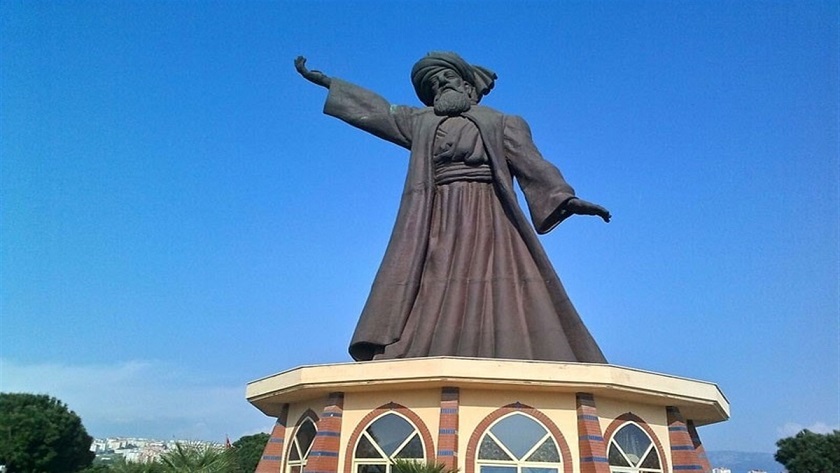 Rumi's statue
Rumi's statue
After a sojourn in Baghdad and travel to the holy cities of Mecca and Medina, followed by a brief stay in Damascus, he settled in Konya in Anatolia which was under the Persianate Seljuq Sultanate of Roum – hence his title Rumi. At the age of 67, he passed away in Konya, where he produced his magnum opus the “Masnavi” in the Persian language or Farsi, and where his shrine is located.
In his exquisite poems in Farsi, he has paid homage to the unsurpassed merits of Imam Ali (AS), the divinely decreed vicegerent of Prophet Mohammad (Peace be Upon him).
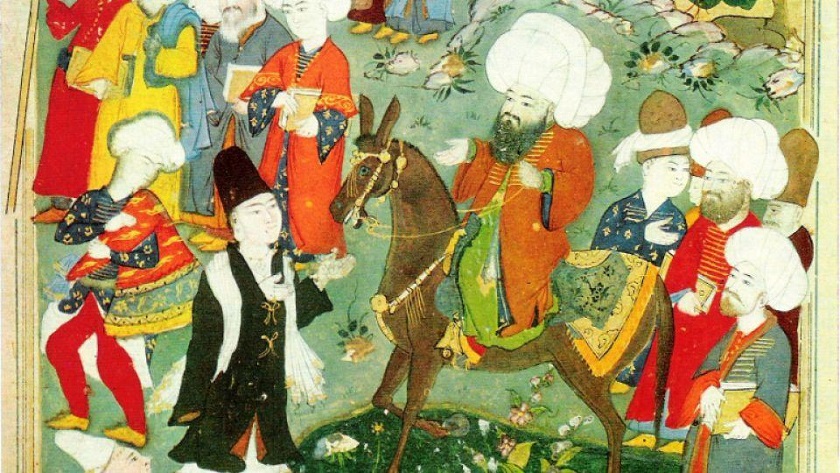 Rumi meetin Shams Tabrizi
Rumi meetin Shams Tabrizi
Related News:
Iran pays homage to Shams, master of Persian poet Mowlavi
Shams Tabrizi; Rumi's mentor
Shams-e Tabrizi (1185–1248) was the spiritual instructor of Mowlana Jalal al-Din Balkhi (Rumi) and is referenced with great reverence in Rumi’s poetic collection in particular ‘Diwan-e Shams-e Tabrizi’ composed in Persian or Farsi (‘The Works of Shams of Tabriz’).
The decisive moment in Rumi’s life occurred on November 30, 1244, when in the streets of Konya he met the wandering dervish holy man Shams al-Dīn (Sun of Religion) of Tabriz, whom he may have first encountered in Syria.
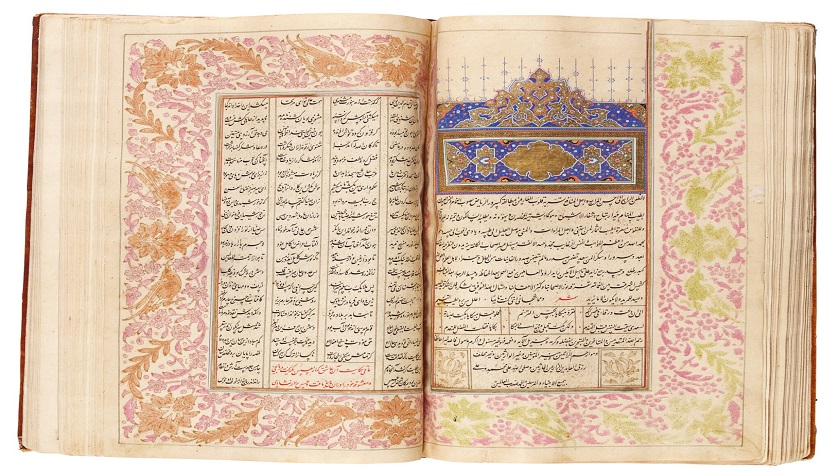 Persian manuscript on gold speckled paper, 356 leaves written in fine nasta’liq in black
Persian manuscript on gold speckled paper, 356 leaves written in fine nasta’liq in black
Literary significance
Mowlana’s poetry is often divided into various categories: the quatrains (rubaiyat) and odes (ghazals) of the Divan, the six books of the Masnavi, the discourses, and the letters, and the almost unknown Six Sermons. Rumi’s major work is Masnavi or Masnavi-ye Manavi (Spiritual Couplets) in the Persian language (Farsi).
Rumi is better known for his six-volume Masnavi Ma’anavi (spiritual couplets) which is considered by many to be one of the greatest works of Islamic mysticism.
His other famous work in the Persian language, Farsi, is 'Divan-e Shams-e Tabriz' (the collected poems of Shams of Tabriz). Rumi's poetry has a mystic connotation, a combination that is the universal language of the human soul. Rumi's title is Mowlana which means our master.
One of his artifacts, Masnavi, the largest mystical exposition in Persian verse, discusses and offers solutions to many complicated problems in metaphysics, religion, ethics, mysticism, etc.
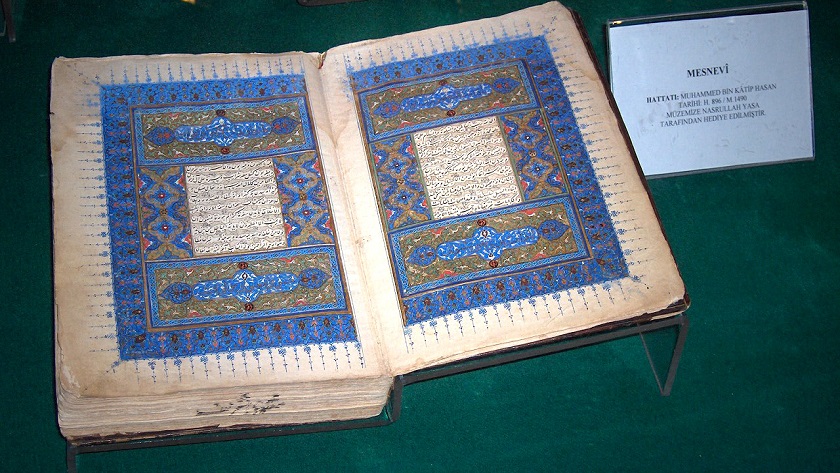 Rumi enriched world literature by composing Masnavi
Rumi enriched world literature by composing Masnavi
The translation of Jalal Uddin Mowlavi Roumi's poems also revolutionized world literature. The world has heard Rumi's message and has been fascinated by his lovely verses. German orientalist, Karl Hermann Ethe, says, "Whenever Rumi was filled with the love of attaining the divine mysteries, he would compose those countless blossoms of pure mystical lyrics. In terms of the beauty of language and rhythmicality of the lines, it is considered the jewel of the world literature."
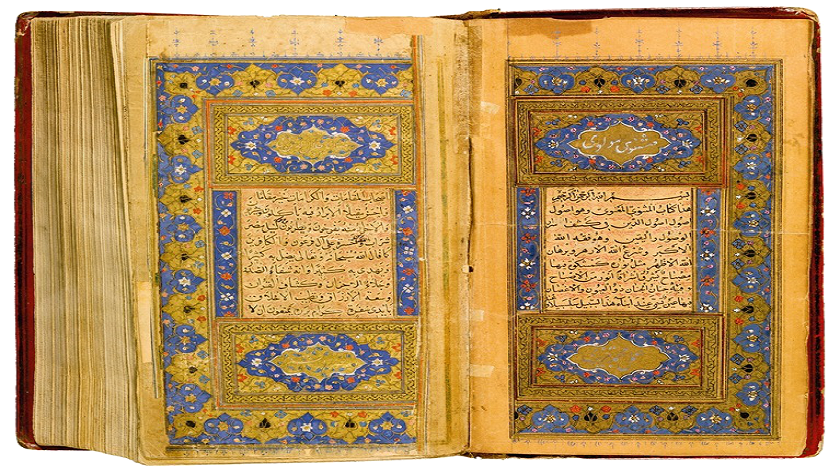 Rumi composed his inspiring literature in Persian (Farsi)
Rumi composed his inspiring literature in Persian (Farsi)
Legacy
Rumi's work has been translated into many of the world's languages, including Russian, German, Urdu, Turkish, Arabic, Bengali, French, Italian, and Spanish, and is being presented in a growing number of formats, including concerts, workshops, readings, dance performances, and other artistic creations. The English interpretations of Rumi's poetry have sold more than half a million copies worldwide, and Rumi is one of the most widely read poets in the United States.
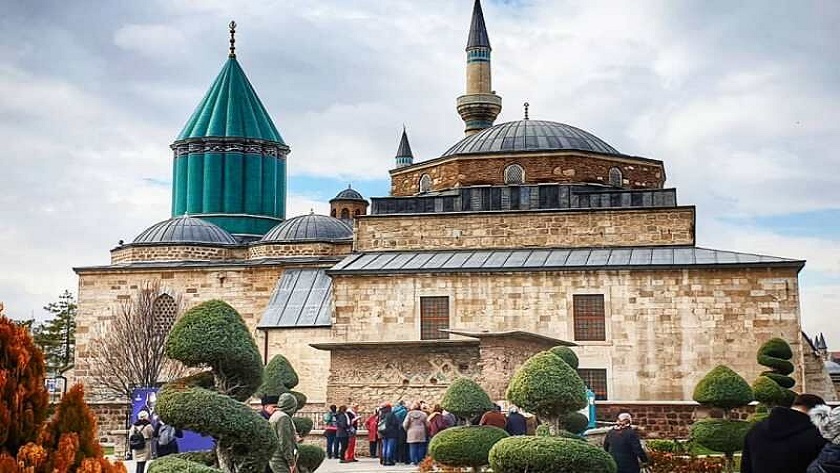 Rumi's tomb in Konya
Rumi's tomb in Konya
These cultural, historical and linguistic ties between Rumi and Iran have made Rumi an iconic Iranian poet, and some of the most important Rumi scholars including Foruzanfar, Naini, Sabzewari, etc., have come from modern Iran. Rumi's poetry is displayed on the walls of many cities across Iran, sung in Persian music, and read in school books.
Rumi's poetry forms the basis of much classical Iranian and Afghan music. Contemporary classical interpretations of his poetry are made by Muhammad Reza Shajarian, Shahram Nazeri, and Ustad Mohammad Hashem Cheshti (Afghanistan).
Read More:
Persepolis; What Iran is known for
Iranian Carpet; what Iran is known for
Persian Qanat; what Iran is known for
Ashkan Salehian

